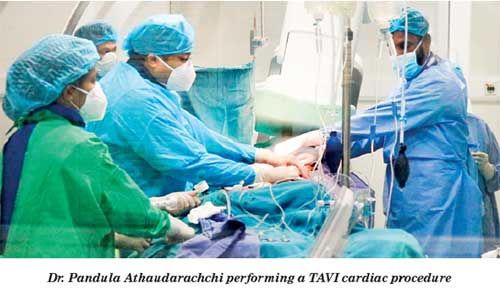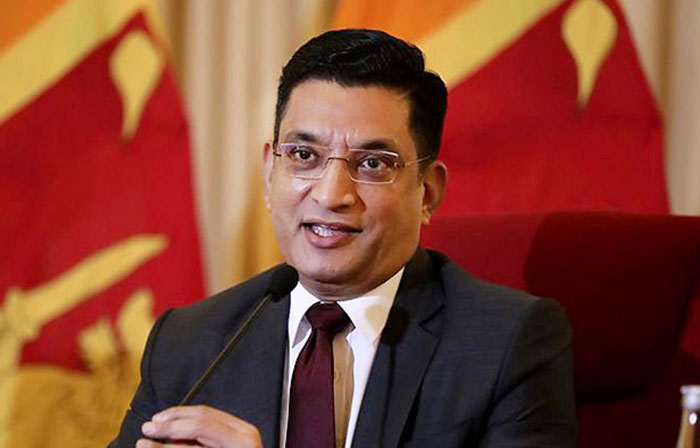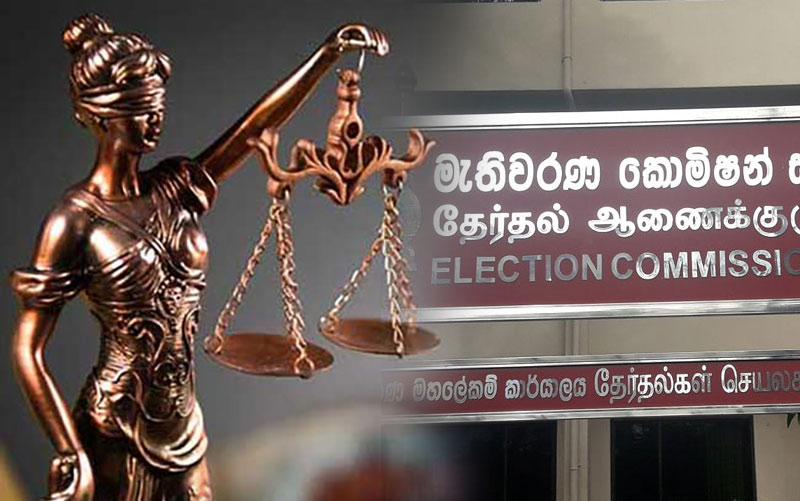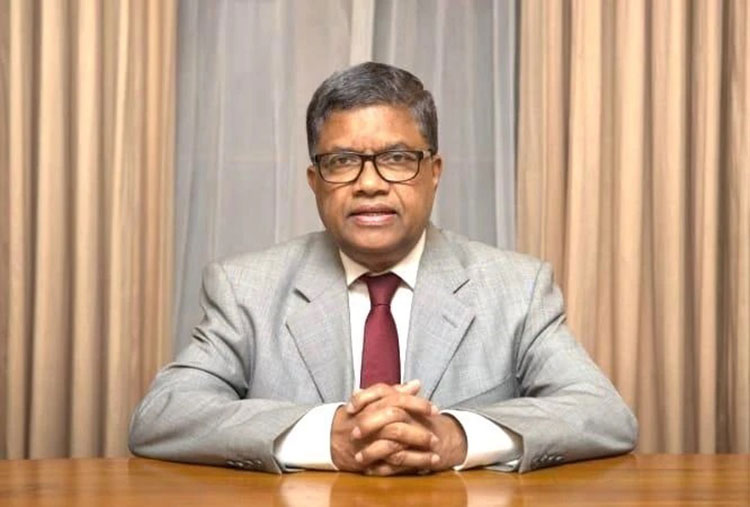News
Durdans Heart Centre performs five successful TAVI cardiac procedures for the first time in SL

Durdans Heart Centre has reached a landmark by performing five successful TAVI (Transcatheter Aortic Valve Implantation) cardiac procedures, while the patients were under local anaesthesia, for the first time in Sri Lanka.
Dr. Pandula Athauda-Arachchi became the first Sri Lankan, fully independent specialist to have implanted TAVI valves under this procedure. He is also credited with implanting devices in t0wo different platforms and performing Sri Lanka’s first TAVI for morphologically abnormal bicuspid valves as well as the normal tricuspid valves.
The aortic valve plays a key role in the body’s blood pumping mechanism. It’s failure causes chaos in all the vital organs. Factors such as age-related wear and tear or defects from birth can cause the aortic valve to narrow, restricting blood flow which deprives the rest of the body of oxygen.
Dr. Athuada-Arachchi explained that the Transcatheter Aortic Valve Implantation (TAVI), with meticulous pre-planning, enabled him to replace the valve within 90 minutes in certain cases. Despite operating on high-risk individuals, it reduces the risks associated with open-heart surgery and general anaesthesia. It involves carefully choosing and placement of a balloon-expandable (MyVal or Edwards) or self-expanding (Medtronic Evolut™ R) transcatheter aortic heart valve after precise crushing off of the diseased valve leaflets.
Every year, many such patients who need an aortic valve replacement, are deemed to be of high risk, will be turned down for open-heart aortic valve replacement surgery and eventually end up with prolonged heart failure or sudden death.
Due to innovation and progress in the medical industry and skilled medical specialists over the last few years, this unmet need for high-risk valve replacement has become simpler and safer with the use of TAVI.
The procedure is performed by inserting a catheter with the valve into the body through a small incision and navigating it to the affected valve, the patient remains fully conscious during the procedure, which only lasts about 90 minutes. TAVI allows for a shorter recovery time, mobilisation within 24 hrs and reduces the risk of infection, stroke, need for dependence on ventilators. Typically, despite their age or multiple medical issues, patients can be discharged from the hospital in three days.
Recently, TAVI was performed on two elderly patients at the Durdans Heart Centre.
News
Indo-Lanka MoUs unlikely to be tabled in Parliament any time soon

…of seven SOCs only one constituted so far
Sri Lanka’s controversial MoU on Defence Cooperation with India was unlikely to be taken up any time soon in Parliament in spite of the House Sectoral Oversight Committee (SOC) on Governance, Justice and Civil Protection that has been assigned defence, authoritative sources told The Island.
Of the seven SOCs only one was activated with the recent election of Dr. Najith Indika, MP, as the Chairman of the Sectoral Oversight Committee on Governance, Justice, and Civil Protection of the Tenth Parliament.
The inaugural meeting of the current parliament was held on 21 Nov., 2024.
Sources said that the parliament had met for the last time yesterday (10) before the Sinhala and Tamil New Year holiday. It is scheduled to meet again on May 8.
The UNDP that has financially backed the establishment of the SOC system to help strengthen the role of the parliament recently reached a consensus with the government to reduce the number of SCOCs from 17 to seven. The Island, in writing, asked for the UNDP’s reaction to the operation of SOCs but had not received a response at the time this edition went to press.
The SOCs have the power to examine any Bill, except the Bills defined in Article 152 of the Constitution, Treaty, Reports including the Annual and Performance Reports relating to the institutions coming under its purview or any other matter referred to the Committee by Parliament or any Committee or a Minister relating to the subjects and functions within their jurisdiction.
Sources said that out of the seven SOCs only one had been activated during the past five months though the government and the Opposition agreed to share the leadership of them.
Accordingly, it was agreed that the government would appoint chairpersons to four SOCs –– Economic Development and International Relations, Health, Media and Women’s Empowerment, Science, Technology and Digital Transformation and Governance, Justice and Civil Protection .
It was also agreed that the Opposition would appoint chairpersons to the SOCs on Infrastructure and Strategic Development, Education, Manpower and Human Capital, and Environment, Agriculture and Resource Sustainability to the Opposition.
India and Sri Lanka on April 5 signed six MoUs on HVDC interconnection for import/export of power, cooperation in the field of sharing successful digital solutions implemented at population scale for digital transformation, defence cooperation, multi sectoral grant assistance for Eastern province, health and medicine and pharmacopoeia cooperation. In addition to them, India, Sri Lanka and UAE signed a tripartite MoU cooperation in development of Trincomalee as an energy hub.
The Island asked Ali Sabry, PC, who served as foreign minister during Ranil Wickremesinghe’s tenure as the President (July 2022 to Sept 2024) whether the seven MoUs had been discussed during that period. We also asked him whether those MoUs should have been discussed at SOCs before finalisation.
Sabry said: “Most of the MOU to my knowledge were discussed except the one on Defence Cooperation, which I am unaware of. General procedure is the relevant line ministry prepares the initial draft and gets the input from the Foreign Ministry and goes for stakeholder consultation of all ministries and agencies involved. Then the President’s Office grants its sanction and with the approval of the AG, it goes before the cabinet of ministers. With Cabinet approval, the government could sign the MOU.”
Sabry said that he was of the opinion that once the government signed a particular MoU, it should be placed before the parliament. “MOU’s are generally not legally binding and only signify the desire to work together. If the signed MoUs were to be implemented, then they have to be followed by agreements or laws.”
He emphasised the pivotal importance of transparency in the whole process. The ex-minister said: “I think transparency is crucial in these matters. Concealment leads to speculation and assumption of the worst. The MOUs should be tabled in Parliament for public information. Discussion at the relevant SOCs would have been helpful. There are growing fears fueled by lack of information in the public domain. This is a private comment, not to be attributed to me.
Asked whether MoUs, particularly the ones on defence and energy had to be approved by the Attorney General, the former minister said that the AG has to advise the MoUs compatibility with the Constitution. “But Article 157 of the Constitution does not apply; the 2/3 majority stipulated there envisages only investment treaties.” Foreign Minister Vijitha Herath assured Parliament on April 8 that the AG had cleared all seven MoUs and none of them were inimical to the country.
By Shamindra Ferdinando
News
LG polls: Appeal Court orders EC to accept 35 additional nomination papers

The Court of Appeal yesterday ordered the Election Commission (EC) to accept 35 additional nomination papers for the 2025 local government elections, which had been previously rejected by election officials.
The ruling was issued yesterday by a bench comprising Acting President of the Court of Appeal, Justice Mohamed Lafar Tahir, and Justice Priyantha Fernando. The court ordered the relevant Returning Officers to accept the nominations following hearings on several petitions filed by political parties and independent groups challenging the rejections.
Last week, the Court of Appeal ordered the EC to accept 37 previously rejected nomination papers.
by A.J.A. Abeynayake
News
Defence MoU with Quad member will drag Sri Lanka further into new cold war: CP

The Communist Party (CP) of Sri Lanka yesterday (10) expressed grave concern over the NPP government’s unilateral decision to enter into a defence MOU with Quad-member India.
The CPSL urged All democratic and progressive forces to pressure the government to reveal the contents of the defence agreement with India. It also asked the NPP government to revive the Indian Ocean Peace Zone proposal at the UN and mobilise global opposition to militarisation in the region. All democratic and progressive forces had to build a United Front against a New Cold War, the CP has said.
General Secretary of CP Dr. G. Weerasinghe has issued the following statement: “This decision has been taken without consultation or debate in Parliament and in the context of a New Cold War and heightened militarisation of the Indian Ocean.
During Indian Prime Minister Narendra Modi’s visit to Sri Lanka from 4-6 April, a defence MOU was exchanged between Secretary of the Ministry of Defence of Sri Lanka retired Air Vice Marshal H.S. Sampath Thuyacontha and Indian Foreign Secretary Vikram Misri.
Indian media has framed this MOU as being part of Indian strategy to counter China’s presence in the region.
President Anura Kumara Dissanayake assured Modi that Sri Lanka, “will not permit its territory to be used in any manner inimical to the security of India as well as towards regional stability”. While the CPSL has no fundamental objection to this, questions remain over India’s own commitment to regional stability.
The fact is that India is a member of the Quad and has partaken in US efforts to contain China in a New Cold War. In 2024, current US Secretary of State Marco Rubio tabled a bill in congress to grant India a status on par with NATO members. During a meeting between Modi and US President Donald Trump in February, India and the US entered into a 10-year defence partnership framework to transfer technology, expand co-production of arms, and strengthen military interoperability.
By entering into defence agreements with India, there is a very real danger of Sri Lanka being dragged into the Quad through the back door as a subordinate of India. Sri Lanka could become a de facto part of the Indo-Pacific Strategy and compromise its non-aligned status. This would be antithetical to Sri Lanka’s interests as China is a major investor and trade partner for the country and has supported our sovereignty in international fora.
Sri Lanka is currently not directly embroiled in any conflict with an external actor and therefore has no need to enter into defence agreements. The last defence agreement that Sri Lanka entered into was with the UK-Ceylon Defence Pact (1947-1957), which was a neocolonial arrangement detrimental to Sri Lanka’s sovereignty and international relations.
The defence MOU with India could also be interpreted as a step towards further militarisation of the Indian Ocean, which is a violation of the UN Declaration of the Indian Ocean as a Zone of Peace which both countries supported.”
-

 Business4 days ago
Business4 days agoColombo Coffee wins coveted management awards
-

 Business6 days ago
Business6 days agoDaraz Sri Lanka ushers in the New Year with 4.4 Avurudu Wasi Pro Max – Sri Lanka’s biggest online Avurudu sale
-

 Features5 days ago
Features5 days agoStarlink in the Global South
-

 Business6 days ago
Business6 days agoNew SL Sovereign Bonds win foreign investor confidence
-

 Features2 days ago
Features2 days agoSri Lanka’s Foreign Policy amid Geopolitical Transformations: 1990-2024 – Part III
-

 Features5 days ago
Features5 days agoModi’s Sri Lanka Sojourn
-

 Midweek Review2 days ago
Midweek Review2 days agoInequality is killing the Middle Class
-

 Features4 days ago
Features4 days agoSri Lanka’s Foreign Policy amid Geopolitical Transformations: 1990-2024 – Part I












